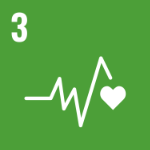

3. Good health and well-being
Baby steps towards transparency in Portugal: disclosing financial transactions between the pharmaceutical industry and healthcare professionals
Over the last few decades, concerns about transparency – or lack thereof – in healthcare have risen in many countries and on several distinct levels. All over the world, the pharmaceutical industry makes direct financial transfers to healthcare professionals, such as doctors, nurses, pharmacists, and patient associations, in exchange for keynote talks at congresses, participation in conferences, advisory boards, and industry organized trainings, among others.
Research has shown that financial ties between the pharmaceutical industry and healthcare professionals can influence treatment decisions by physicians, introducing bias in clinical practice, decision-making, and policy. In most countries, these transfers are not disclosed and patients cannot know whether their doctor has financial connections to the company whose drug they is prescribing (the United States being a notable exception).
With Decreto-Lei 20/2013, published on the 14th of February, Portugal established a framework for mandatory disclosure of financial ties between the pharmaceutical industry and healthcare professionals. One important goal of this framework was to have a digital platform where all such transactions would be stored and easily accessible by any stakeholder.
That platform is hosted at the website of Infarmed IP, the national authority of medicines and health products, and can be accessed here. All transactions over 60€ are recorded in this platform. For each transaction, one can see the identity of the contributing and receiving entities, the amount of the transaction, and its purpose.
However, the platform does not enable users to make use of any of that information without a considerable investment in terms of time and effort.
The most important issue, from the viewpoint of patients, is that there is no search tool. Thus, patients cannot look up their doctors to see whether they have financial ties with the pharmaceutical industry and the extent of such ties. The data is there, but patients cannot easily make use of it.
More broadly, there is no possibility of downloading the data in order to conduct a statistical analysis. As a result, society cannot easily learn about the characteristics of the financial transactions taking place between the pharmaceutical industry and healthcare professionals.
How much do transfers between the pharmaceutical industry and healthcare professionals amount to, annually? How much is a given patient association or physician receiving from pharmaceutical companies? Are transfers heavily concentrated amongst a small set of high-profile clinicians? How do these transfers behave around the product launch by a pharmaceutical company? These are all important questions that we could potentially get answers to, if only the transparency platform were more user-friendly.
Unfortunately, other European countries are not doing any better. Most of them have no government-imposed disclosure requirements and the industry has developed its own transparency measures. This results in a large degree of heterogeneity among countries regarding, for example, the nature of the transactions that should be reported. Moreover, most countries do not have a centralized platform where a full registry of the financial transactions between the pharmaceutical industry and healthcare providers is located: in Germany, Spain, Italy and Sweden, such data are only available on each individual company’s website or as separate PDFs on the industry association’s webpage.
Overall, European countries need to increase transparency regarding financial ties between the pharmaceutical industry and healthcare professionals. Government-imposed disclosures are a step in the right direction, but there is still a long way to go. Inspiration for enhancing the ease of accessibility and use of such data can be drawn from the United States.

